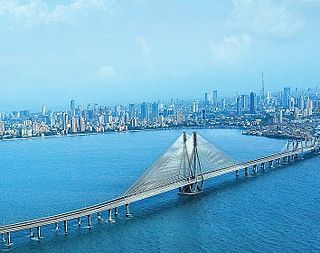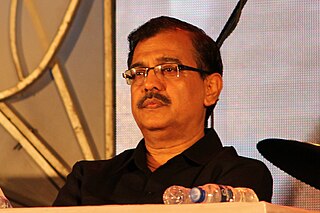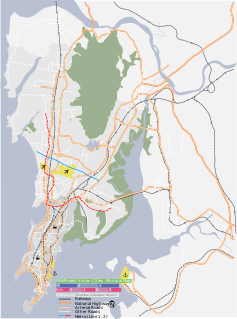
Mumbai is the capital city of the Indian state of Maharashtra. According to United Nations, as of 2018, Mumbai was the second most populous city in India after Delhi and the seventh most populous city in the world with a population of 19.98 million. As per Indian government population census of 2011, Mumbai was the most populous city in India with an estimated city proper population of 12.5 million living under Municipal Corporation of Greater Mumbai. Mumbai is the centre of the Mumbai Metropolitan Region, the sixth most populous metropolitan area in the world with a population of over 23.64 million. Mumbai lies on the Konkan coast on the west coast of India and has a deep natural harbour. In 2008, Mumbai was named an alpha world city. It has the highest number of millionaires and billionaires among all cities in India. Mumbai is home to three UNESCO World Heritage Sites: the Elephanta Caves, Chhatrapati Shivaji Maharaj Terminus, and the city's distinctive ensemble of Victorian and Art Deco buildings.
The 1993 Bombay bombings were a series of 12 bomb explosions that took place in Mumbai, India, then known as Bombay, on 12 March 1993. The single-day attacks resulted in 317 fatalities and 1,400 injuries.

The History of Mumbai, can be traced back to 600 BC, when evidences of the first known settlement,Harrappan Civilization, here have been discovered.

The 2006 Mumbai train bombings were a series of seven bomb blasts on 11 July. They took place over a period of 11 minutes on the Suburban Railway in Mumbai, the capital of the Indian state of Maharashtra and the nation's financial capital. The bombs were set off in pressure cookers on trains plying on the Western Line Suburban Section of the Mumbai Division of Western Railway. The blasts killed 209 people and injured over 700 more.
The 25 August 2003 Mumbai bombings were twin car bombings in the Indian city of Mumbai that killed 54, and injured 244 people. One of the bomb explosions took place at the Gateway of India, which is a major tourist attraction. The other bomb went off in a jewellery market Zaveri Bazaar near the Mumba Devi temple in central Mumbai. Both the bombs were planted in parked taxis and exploded during the lunch hour. No group initially claimed responsibility for the attack, but Kashmir rebel group and Pakistan-based Lashkar-e-Toiba was blamed for it.
At 21:15 hrs on 28 July 2003 a bomb placed under a seat of a B.E.S.T. bus exploded on the busy Lal Bahadur Shastri Marg in Ghatkopar. The bomb was placed in the rear of the bus, killing four people and injuring 32. A man who was riding a motorcycle behind the bus and a woman who was in a rickshaw travelling near the bus were among those killed. An eyewitness claims that the woman was thrown at least ten feet away from the rickshaw and died on the spot.
At 18:45 IST on Monday, 2 December 2002, a bomb placed under a seat of a B.E.S.T. bus exploded near the busy Ghatkopar station. The bomb was placed in the rear of a bus near the station and killed two people and injured over 50. Ghatkopar being the final stop, all the passengers in the bus had just alighted and passengers for the return trip had not yet entered the bus. The people who were killed were those present in the busy station area.
On 27 January 2003, a bomb placed on a bicycle exploded near the busy Vile Parle railway station in Mumbai, India. The bomb killed one person and injured 28. The blast occurred when Atal Bihari Vajpayee, the Prime Minister of India at the time, was to visit the city.
At 19:45 hrs on 13 March 2003, a bomb exploded as a train pulled into the Mulund railway station. The bomb was placed in the first class ladies' compartment and killed 10 people with 70 injured. Among the ten killed were four women in the first class compartment, two of which were police constables, and six men who were in the adjoining second class compartment.

Mumbai Meri Jaan is a 2008 Indian drama film directed by Nishikant Kamat and produced by Ronnie Screwvala. It stars Madhavan, Soha Ali Khan, Irrfan Khan, Paresh Rawal and Kay Kay Menon. It deals with the aftermath of the 11 July 2006 Mumbai train bombings, where 209 people lost their lives and over 700 were injured. It won multiple Filmfare Awards.

Zaveri Bazaar is a jewelry market and a major hub for B2B and B2C jewelry industry in Mumbai, India. Located at Bhuleshwar in South Mumbai, just north of Crawford Market, Zaveri Bazaar is a muddle of narrow lanes, dotted with hundreds of jewelry shops that sell gems and jewels, notably Tribhovandas Bhimji Zaveri (TBZ), Dwarkadas Chandumal, Dhirajlal Bhimji Zaveri & UTZ. 65% of all gold trading and dealing in India is estimated to originate from the market. During the early 19th century a jeweller named Ambalal Zaveri was very famous for his great quality of gold, due to his death his great reputation slowly collapsed due to disputes between his sons.
Human habitation of Mumbai existed since the Stone Age, the Kolis and Aagri(a Marathi fishing community) were the earliest known settlers of the islands. The Maurya Empire gained control of the islands during the 3rd century BCE and transformed it into a centre of Buddhist culture and religion. Later, between the 2nd century BCE and 9th century CE, the islands came under the control of successive indigenous dynasties: Satavahanas, Abhiras, Vakatakas, Kalachuris, Konkan Mauryas, Chalukyas and Rashtrakutas, before being ruled by the Silharas from 810 to 1260.
The history of Mumbai during the 21st century recounts the Indian city of Mumbai in the 21st century when the city suffered several terrorist attacks.

The 2008 Mumbai attacks were a series of terrorist attacks that took place in November 2008, when 10 members of Lashkar-e-Taiba, an extremist Islamist terrorist organisation based in Pakistan, carried out 12 coordinated shooting and bombing attacks lasting four days across Mumbai. The attacks, which drew widespread global condemnation, began on Wednesday 26 November and lasted until Saturday 29 November 2008. At least 174 people died, including 9 attackers, and more than 300 were wounded.

Ujjwal Nikam is an Indian special public prosecutor who has worked on prominent murder and terrorism cases. He helped prosecute suspects in the 1993 Bombay bombings, the Gulshan Kumar murder case, the Pramod Mahajan murder case, and the 2008 Mumbai attacks. He was also the special public prosecutor in the 2013 Mumbai gang rape case, 2016 Kopardi rape and murder case.

Jerry Pinto is a Mumbai-based Indian writer of poetry, prose and children's fiction, as well as a journalist. Pinto writes in English, and his works include, Helen: The Life and Times of an H-Bomb (2006) which won the Best Book on Cinema Award at the 54th National Film Awards, Surviving Women (2000) and Asylum and Other Poems (2003). His first novel Em and the Big Hoom was published in 2012. Pinto won the Windham-Campbell prize in 2016 for his fiction. He was awarded the Sahitya Akademi Award in 2016 for his novel Em and the Big Hoom.

The 2011 Mumbai bombings were a series of three coordinated bomb explosions at different locations in Mumbai, India, on 13 July 2011 between 18:54 and 19:06 IST. The blasts occurred at the Opera House, at Zaveri Bazaar and at Dadar West localities, leaving 26 killed and 130 injured.
Dawood Ibrahim Kaskar is a Mumbai underworld figure, criminal mobster and drug dealer most wanted by India with a reward of $25 million over his head, and has been wanted since 1994. He is originally from Dongri in Mumbai, India.

The Inter-Services Intelligence (ISI), intelligence agency of Pakistan has been involved in planning, preparing and carrying-out terrorist attacks against the people of Indian and running so-called "military intelligence" programs in India, with one of the subsections of its Joint Intelligence Bureau (JIB) department devoted to carrying out these acts of terrorism in India. The Joint Signal Intelligence Bureau (JSIB) department has also been involved in providing communications support to Pakistani terrorists operating in regions of the State of Jammu and Kashmir of India. The Joint Intelligence North section of the Joint Counter-Intelligence Bureau (JCIB) wing deals particularly with India. In the 1950s the ISI's Covert Action Division supplied arms to insurgents in Northeast India.









